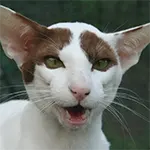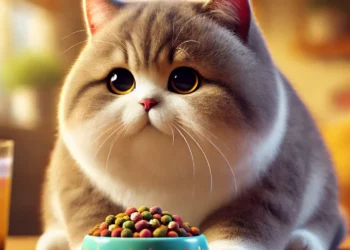
Orientals are medium in size, but they weigh more than they appear. The body is similar to the Siamese: long, slender, with a long whip-shaped tail and long, slender legs.
Summary
Origin and History
The Oriental Shorthair was developed in the 1950s and 1960s through a series of crossbreedings involving Siamese cats and other non-pointed domestic cats, aiming to create a Siamese-type cat with a wider range of coat colors and patterns. The breed quickly gained popularity for its striking appearance and engaging personality. It was officially recognized by major cat registries in the 1970s. Today, the Oriental Shorthair is celebrated for its vast array of more than 300 color and pattern combinations, including solid, tabby, smoke, and bi-color.
Physical Characteristics
Characterized by a svelte, muscular body, the Oriental Shorthair is a study in elegance and agility. Its long, slender legs and tail, combined with a wedge-shaped head, give it a distinctive and refined appearance. The breed’s large, pointed ears are set wide apart, enhancing its alert and curious expression. The coat is short, fine, and lies close to the body, showcasing its lithe figure. The eyes are typically green, except in white or bi-colored cats, where blue or odd-eyes are possible.
Personality and Temperament
Oriental Shorthairs are known for their high energy, intelligence, and affectionate nature. They form strong bonds with their families and often follow their owners around the house, participating in whatever activities are going on. Their vocalizations are less intense than those of their Siamese relatives but expect them to “talk” to you about their day, their needs, and their observations. They thrive on interaction and dislike being left alone for extended periods, making them suited to homes where they can enjoy constant companionship or the company of other pets.
Care and Health
Oriental Shorthairs are generally healthy, but they can inherit some of the genetic conditions common to the Siamese, such as dental issues, heart problems (like hypertrophic cardiomyopathy), and respiratory issues. Their short coat is easy to care for, requiring only occasional brushing to remove loose hair. As with all cats, maintaining a healthy weight through a balanced diet and regular exercise is vital, along with routine veterinary check-ups to monitor their health.
Living with an Oriental Shorthair
Oriental Shorthairs are adaptable and can flourish in various environments, from quiet apartments to bustling family homes. They are particularly good for families with children and other pets, given their social nature and need for interaction. Providing a stimulating environment with plenty of toys, climbing opportunities, and human interaction can keep them mentally and physically engaged. For those who welcome an Oriental Shorthair into their home, the reward is a lively, loving companion that enriches life with its distinctive charm and personality.
Latest on CatOlympus
Effects Of Music On Cats: Do Cats Enjoy Music?
For many cat owners, music is a regular part of daily life. We play it while cooking, cleaning, relaxing, or...
Myths And Truths About Feeding Your Cat
Feeding your cat is more than just picking up the nearest bag of kibble. It’s about providing balanced nutrition to...
How To Ensure Your Cat Drinks Enough Water
Water is essential for life, and just like humans, cats need adequate hydration to maintain their health and well-being. However,...
How to Spot and Prevent Parasites In Cats
Parasites are an unfortunate but common issue that many cat owners will face at some point. These unwelcome visitors can...









